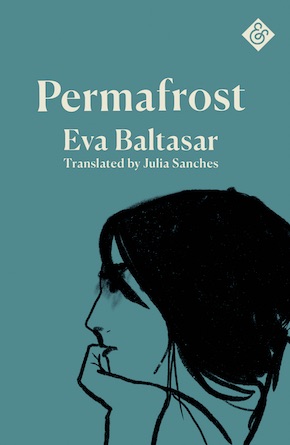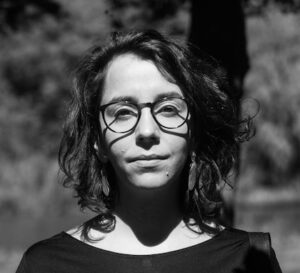Veronika
by Eva Baltasar
“Forthright, fearless and funny, a maximal reading experience.” Wendy Erskine
“Épouse-moi!” Though I’ve had fabulous lovers, they’re never so fabulous as the day I leave them. “Marry me,” Veronika said again. She looked stunning. She was big, larger than me by at least three dress sizes – a Belgian with the bearing of a Viking, educated at the best universities in Flanders and the United States. Her flesh was firm and plentiful and her breasts soft and round as water balloons. She had thick, silken hair that reminded me of the surreal bundles of fiber optics that a technician had once threaded through the façade of my Barcelona apartment. Her eyes were impressive, an intricate glass mosaic that stared into mine, pulsing like a fetus and inexplicable as a miracle, when she came beneath me. We both loved chocolate. We used to buy Godiva bonbons, shut ourselves up in her apartment, and eat them in bed, letting the chocolate melt over our skin. Food play is a weakness of mine. She was seven years my senior and held some sort of managerial position at C&A. We’d met by chance, and if there’s one thing I believe in, it’s chance. Despite the Herculean efforts of new religions to deny it, chance continues to exist. I had moved to Brussels three months earlier and was renting a room from a woman in her late sixties. Her name was Brigitte and she wore dentures. Brigitte had a huge, shaggy, ancient black dog that slept in my room on a makeshift bed on a carpet of its own furballs. The dog’s name was Taps. My room was the largest in the house, and it had everything: a double bed with a lumpy mattress, a faded yet comfortable sofa, a run-down wardrobe, an old desk, a fine chest of drawers, a sound system, and a TV. It was a centrally located, decently priced mini-studio. Brigitte represented what I imagined my future would have looked like if my aunt hadn’t put me out on the street: a lifetime pensioner with an autistic dog as her only companion. She was very friendly. “Que fait une fille comme vous à Bruxelles?” I explained that I had just graduated from university and there were no jobs in my home country. The truth was I hadn’t bothered to look. Desperate to get out of Barcelona, and with enough money in my pocket for six or seven months of inexpensive rent, I decided to travel. I’d chosen Brussels because a city whose symbol is a little boy pissing was a city I knew I would like. I didn’t tell my parents until a few weeks after moving – a policy of fait accompli, a matter of survival. My savings began to dwindle. A couple of months later, I published an ad in a magazine – “Spanish teacher,” it read – and quickly forgot about it. A man called me to hold what some might consider a fishy conversation. The voice on the other end sounded British and claimed to run a language school. He was in urgent need of a Spanish teacher and scheduled a meeting with me in a neighborhood on the outskirts of town. I consulted Brigitte, who confirmed that the neighborhood was as fishy-sounding as the phone call.
Desperate to get out of Barcelona, and with enough money in my pocket for six or seven months of inexpensive rent, I decided to travel. I’d chosen Brussels because a city whose symbol is a little boy pissing was a city I knew I would like.”
On the morning of the interview, I left a note on the oilcloth on the kitchen table, where I knew Brigitte would find it, with the school’s address and instructions to call Interpol if I wasn’t home within twenty-four hours. I was hesitant at first, but then it dawned on me that risking life and freedom for money was actually common practice, and at the very last minute, I decided to take Taps with me. An excellent plan. He didn’t make me feel any safer, but having something other than myself to worry about made it harder for me to turn back. It was a long metro ride and Taps sat in my lap, which quickly went numb. Then a dead-legged transfer, hobbling like a blind woman with her seeing-eye dog. The next car was mostly empty. I noticed that for every station there seemed to be a prototypical rider. Sometimes, the same prototype spanned two or three stops. At other times, there were multiple prototypes per station. Yet they gradually gained definition. By the last stop, I felt completely out of place. As I walked out of the car, a teenager strung out on drugs made way for me. God bless Belgians! Friendliest Europeans I know. While I contemplated what exit to take, a tired woman weighed down by Colruyt bags came toward me. The bags under her eyes looked even heavier than her Wednesday shopping. Taps was restless, snuffling left and right in that obsessive way dogs have of sniffing out other animals’ piss. I decided to let myself be led by his instincts, and we made it onto the street. There, I followed directions scribbled on a Post-it that fit into the palm of my hand. I had no trouble finding the address.
The building could have been worse. I rang the bell and the door opened as if somebody upstairs had been waiting for me with their finger on the buzzer. This set me on edge. They hadn’t even asked for my name. I was about to turn around and leave when Taps nudged the door open with his wet snout and dragged me in. The lobby was passable. Traces of urine drowned out by liters and liters of bleach hung in the air, but there was an elevator and a couple of decent-looking strollers parked under the letterboxes. I pivoted toward the staircase. I was in no mood to shut myself in a cage with an animal, even if the animal in question was Taps, who I shared a room with every night. On the third floor, a young-looking British guy stood leaning against the door frame to his apartment, waiting for me. He ushered me into a large, empty space with no visible furniture. The Brit was bald and friendly and he smiled at us – at Taps and me in turn – twice. It dawned on me that the apartment might be a front, that in a back room somewhere, a hoard of pretty girls was possibly gagged and bound, hands and feet tied together with one long, improbably knotted rope. My mouth went dry. What would become of me? I wasn’t even pretty! A thousand thoughts formed and evaporated like spray, like lattice flashes of night, fluctuations on a spectrometer. The British guy led us into an office, where I was surprised to see a table, office chairs, and a long bookcase full of textbooks. The sudden drop in my adrenaline made me dizzy, so I sat down. The British guy then explained his business to me. He had teachers of “every language” working for him. His clients were large companies, and he arranged private classes for their managers at their homes on a predetermined schedule. He could pay me forty-five euros an hour. Forty-five euros an hour! And his profit margins were probably still high. I couldn’t believe it, but even so, I took the job and gave the clever Brit my account number, knowing full well I shouldn’t. In exchange, he handed me his business card, Spanish textbooks 1, 2, and 3, and a timetable. I also signed a contract of unclear legality. Honestly, I couldn’t have cared less. We said goodbye and he told me he would call once he’d arranged classes with my first client. I hurried out, Taps panting behind me as though he had asthma. As I sat on the metro, I realized my legs were shaking – but I was happy! Like I’d been sent away to summer camp while my friends were all stuck in iron lungs, a strange kind of happiness that comes from narrowly escaping disaster. I returned Taps to his owner in adequate condition and spent lunch leafing through the textbooks.
Some women make me feel wholly lesbian. It’s not that I’ve never been attracted to men, it’s just that there are women with whom I’m a lesbian only to a point. The lesbian is pitted against a whole series of simultaneous roles, as in a clash of intensities.”
My phone rang around midafternoon. When work-related, midafternoon phone calls are by and large inoffensive. It was the great British entrepreneur, my boss, passing on contact details for my first student. Her name was Veronika Goossens and she was a manager at C&A. She lived in an apartment in the city center and had no knowledge of Spanish. Her employer had requested an intensive course of seven-and-a-half hours a week, Monday to Friday, six to seven-thirty in the evening, hours that didn’t suit Brussels natives because they coincided with their near-mandatory leisure time. But I was an immigrant, on top of which I often found leisure tedious. In any case, I spent most of it reading, and it didn’t matter to me when I read. I found Veronika’s address on the map and gave myself a once-over in the mirror. I’d need to do something about my appearance or risk not being let off at her metro stop – a minor prototype issue easily solved with a lightning-fast trip to the mall. I spent the next morning “shopping” and arrived home with half a new wardrobe. It wasn’t quite my style, but it would do: elegantly sober with minimal froufrou. I purposefully avoided C&A. At five to six in the evening, I rang the bell of a spectacular house on a street perpendicular to Grand Place. It wasn’t far from where I lived, but there was no comparison. An exquisite woman answered the door. In under two seconds, I recovered my sex drive, which had lain forgotten in the double-bottom of a suitcase kept under a protuberance-plagued mattress. Some women make me feel wholly lesbian. It’s not that I’ve never been attracted to men, it’s just that there are women with whom I’m a lesbian only to a point. The lesbian is pitted against a whole series of simultaneous roles, as in a clash of intensities. My ego is permanently populated by protected tenants: the daughter, the sister, the friend, the former university student, the neighbor, the reader, the auntie, the landlady, the client, the user, the confident one and her opposite, etc. Every one of these scrappy women coexists with and rivals the lesbian. But faced with Veronika, the lesbian sounded her ear-piercing cry for so long and at such a volume that I had to force the Spanish teacher to speak up. And yet I wasn’t the one who spoke; the lesbian had subdued my innermost self and I was completely compliant. She was the one making my other voices speak and they were small, docile puppets in her hands. “Bonsoir. Je suis la professeur d’espagnol.” She smiled. A burst of pale pink in her grin revealed teeth as perfect as polished icicles. “Bonsoir. Je suis Veronika. Enchantée.” She bent over ever so slightly and gave me three kisses. Our cheeks hardly touched, but I felt her makeup graze the down on my face, keen as sensors. She led me into the living room. The apartment was a refurbished unit in a hundred-year-old building, and everything had the romantic look of the old-but-new. Every design was simple, with the exception of a piece of restored furniture that, though unexpected, blended in like an attractive and spirited orphan. Every surface seemed smooth and flat. There wasn’t a single handle on the furniture, whose edges were polished but never overly rounded. The space flowed in a steady arrangement of white orchids. In fact, there was a lot of white and gray all around. In her too; she exuded the utmost tidiness. Her skin was lily-white and her blazer dark gray. An ivory sweater grasped her neck like a hand, delivering up a face whose focus was a pair of high and wide-set eyes, warm and strangely potent islets of light. A rectangular clip of mother-of-pearl held her hair in a low ponytail, every single strand of it, as if they’d each been collected and counted before being gathered up, as if they were all the same size, even the obnoxious fuzz around the temples, which I’d had since breastfeeding age. We sat at the dining-room table and she offered me a drink. We agreed that classes would be conducted in Spanish and any queries handled in English because my French wasn’t up to the task. The lesbian stepped back and let me teach an adequate lesson, despite being repeatedly distracted by her hands. I fucking love women’s hands. Delicate skin pulled thin like a membrane of constellations, tapered fingers, and the almost lyrical movement of joints. Veronika wore her nails short and coated in clear nail varnish. Short, the way I like them. I had this thought dozens of times. Short, the way I like them. Short, the way I like them. The one repeating this was actually my cunt, unrepentant thinker. An hour and a half later we said goodbye, until tomorrow. Veronika had to learn as much Spanish as she could in six months because she was being sent to Central and South America on temporary positions. C&A was conquering new horizons.
from Permafrost (And Other Stories, £10)
 Eva Baltasar has published ten volumes of poetry to widespread acclaim. Her debut novel, Permafrost, received the 2018 Premi Llibreter from Catalan booksellers and was shortlisted for France’s 2020 Prix Médicis for Best Foreign Book. It is the first novel in a triptych which aims to explore the universes of three different women in the first person. The author lives with her wife and two daughters in a village near the mountains. Permafrost, translated by Julia Sanches, is published by And Other Stories in paperback and eBook.
Eva Baltasar has published ten volumes of poetry to widespread acclaim. Her debut novel, Permafrost, received the 2018 Premi Llibreter from Catalan booksellers and was shortlisted for France’s 2020 Prix Médicis for Best Foreign Book. It is the first novel in a triptych which aims to explore the universes of three different women in the first person. The author lives with her wife and two daughters in a village near the mountains. Permafrost, translated by Julia Sanches, is published by And Other Stories in paperback and eBook.
Read more
@andothertweets
Author portrait © David Ruano
 Julia Sanches translates from Portuguese, Spanish and Catalan. For And Other Stories she has previously translated Now and at the Hour of Our Death by Susana Moreira Marques, and Slash and Burn by Claudia Hernández, for which she won a PEN/Heim award. She has also translated works by Noemi Jaffe, Daniel Galera, and Geovani Martins, among others. She is a founding member of the Cedilla & Co. translators’ collective, and currently lives in Providence, Rhode Island.
Julia Sanches translates from Portuguese, Spanish and Catalan. For And Other Stories she has previously translated Now and at the Hour of Our Death by Susana Moreira Marques, and Slash and Burn by Claudia Hernández, for which she won a PEN/Heim award. She has also translated works by Noemi Jaffe, Daniel Galera, and Geovani Martins, among others. She is a founding member of the Cedilla & Co. translators’ collective, and currently lives in Providence, Rhode Island.
juliasanches.com
Twitter: @sanschaises
Instagram: @sanschaises
Photo © Dagan Farancz

